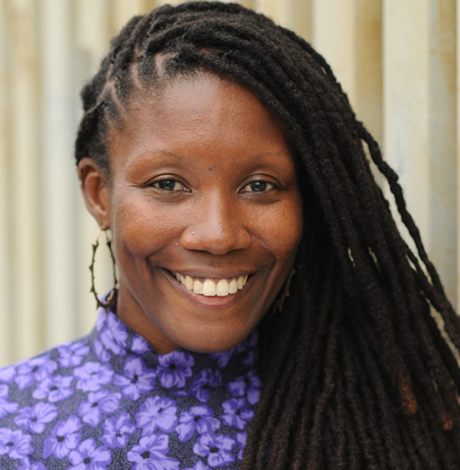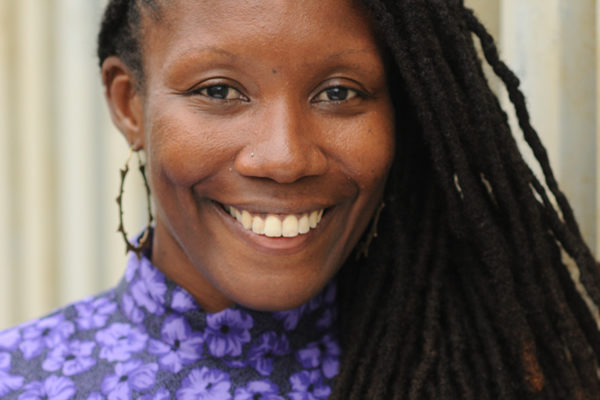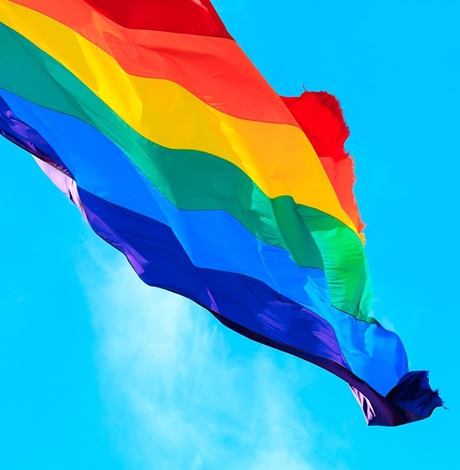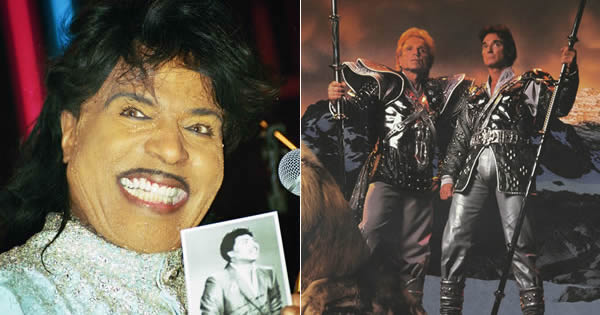Books
Out author Nicole Dennis-Benn unveils knotty new novel ‘Patsy’
Immigration, mothering and queer identity themes in sophomore tome


Nicole Dennis-Benn
Young African Professionals D.C.
Politics and Prose Union Market
1270 5th St., N.E.
‘Patsy’ book release event
$26.95
politics-prose.com
nicoledennisbenn.com
Author Nicole Dennis-Benn got the kind of media attention and interest with her 2016 novel “Here Comes the Sun,” most first-time authors can only dream of — she won a Lambda Literary Award, was a finalist for several other literary prizes, got reviewed in the New York Times (which named it one of its “notable books of the year”) and other high-profile outlets.
Her sophomore effort “Patsy” was released Tuesday and is already generating buzz with more media love from the Times, Oprah’s magazine, NPR and more. “Patsy” is the story of the title character, an undocumented Jamaican queer immigrant in New York and the daughter she left behind, Tru. Going back and forth between Brooklyn and Jamaica, Dennis-Benn, herself Jamaican and a lesbian, covers her characters’ lives over a decade.
The 37-year-old writer will be at Politics & Prose (Union Market) in Washington on Saturday, June 8 at 6 p.m. Details at politics-prose.com. She spoke to the Blade by phone last week. Her comments have been slightly edited for length.
WASHINGTON BLADE: Your first book got the kind of industry attention most authors only dream of. How did you manage that?
NICOLE DENNIS-BENN: When I started my debut novel, I had no idea all the work that went into getting a book out there to readers. I used to think it just appears on the bookshelf. I wasn’t one of those readers in college and grad school looking at the New York Times or the Washington Post for the next book I wanted to read. So I was really shocked as a first-time writer. My agent, she worked really hard at putting my book in the eyes of publishers and also really doubled down when it came out. She said, “This is a debut novel, we have to have a big splash,” so she and her team worked extra hard and I was really happy that they loved it enough to want to really invest in it. But there’s really a machine behind all that publicity.
BLADE: Did you have to fight to get “Patsy” published or was it much easier after the first book was successful?
DENNIS-BENN: It was easy after that, for sure. I had some anxiety writing as a woman of color and my story is about a Jamaican woman wth a queer identity as well as an immigrant … but it’s a relief to know there’s a place for my books. I can’t say the same for many other writers who are women of color or LGBT writers, but at the same time I’m happy that they’re being published somewhere.
BLADE: How has your publisher Liveright been to work with? Any wrangling over final edit?
DENNIS-BENN: It was a good relationship and that’s definitely something I was relieved about. I didn’t have to fight them on anything. I used patois, a Jamaican dialect, in the dialogue and I was really happy that the editor and also the copy editors were able to work with me on maintaining that. I think it was really a good match.
BLADE: Is there some autobiography woven into the fiction?
DENNIS-BENN: I would say it’s like 80 percent fiction and 20 percent autobiographical. Patsy comes to America and wants more for herself but then realizes there are issues here just like anywhere else. Unlike myself, Patsy is not educated or documented, so she immediately meets that wall, no pun intended. She actually gets trapped and she’s not able to move upward financially. She has no social security at all, so of course, taking Patsy on that journey, took a lot more imagination and also talking to folks, like my father for example, who came here undocumented and has worked his way through the system before marrying an American citizen and getting his papers.
BLADE: What is your working process like? How does one begin to tackle a work of this scope?
DENNIS-BENN: I started really with writing scenes. Patsy’s voice came to me first and I wrote more following that voice. I would think about it on my morning ride to Staten Island where I was teaching at the College of Staten Island and it was like I was somehow dictating in the sense that I was imagining this woman riding the subway and she’s on her early morning trip to her first nanny job and really thinking about who that woman is, why did she come to this country, what did she leave behind. … That’s when I started outlining and this is actually the first novel where somehow everything I wrote was against that outline.
BLADE: How did you know instinctively that was right?
DENNIS-BENN: I didn’t know it was right at all. I slept on it awhile. A lot of it came from being raised as a woman in Jamaica, it’s a society that tells you we ought to all want motherhood, that that’s the ultimate satisfaction. Well, so what about this woman who doesn’t really want that but has no choice? It took a lot of self reflection.
BLADE: How long did it take? I assume you balanced it with your teaching duties?
DENNIS-BENN: Right, exactly. Those rides on the ferry were in 2012 so really like seven years.
BLADE: How long did “Here Comes the Sun” take to write?
DENNIS-BENN: It was faster. I started it in 2010 and got my agent in 2014, so more like four years. It was quicker than “Patsy.”
BLADE: How disciplined did you have to be? Were there days your wife wanted to go to the mall or everybody else was on holiday but you forced yourself to write?
DENNIS-BENN: I did it when the mood struck. I was teaching as an adjunct so it was only like two days a week. So on the other days, I stayed home and worked on my books. My wife would be getting rady for work and she leaves around 9 a.m. so that’s when my writing day started and I’d write til about 4. But I didn’t adhere to that every single day, every week. Sometimes ideas would come or not come. Some days the characters would just not speak, so I’d take a little time to do normal things. I feel like living life a little bit, I absorb a lot. So I take myself to the museum, I meet up with friends and somehow gather a lot of energy by stepping away from the work.
BLADE: How long have you been teaching at Princeton?
DENNIS-BENN: A year. I started fall, 2018.
BLADE: What do you teach?
DENNIS-BENN: Creative writing, fiction.
BLADE: Is Joyce Carol Oates still there?
DENNIS-BENN: YEs, but I’ve not met her. I only teach there one day a week. I want to, but I haven’t had the chance.
BLADE: Are you familiar with her work?
DENNIS-BENN: Oh yes, definitely. There are so many people at Princeton working whose work I admire like Jhumpa Lahiri, she’s also there, Tracy K. Smith and Yiyun Li. I had to work on myself not to be star struck in the department.
BLADE: How many copies did you sell of “Here Comes the Sun”?
DENNIS-BENN: Um, I’m not sure. I know it did well. I’m actually only going by what my publishers have been telling me or my agent.
BLADE: But what’s considered successful for a debut hardcover novel?
DENNIS-BENN: I have no idea.
BLADE: Aren’t you curious?
DENNIS-BENN: I’m curious, yeah, but I don’t know. That’s a good question. I think for me … as a creative person, success is actually touching readers, so when I get a note through social media or somebody tells me they saw themselves on the page, that really is success for me.
BLADE: To what degree does being a lesbian inform your work any more or less, say, than being from Jamaica, being an immigrant or other aspects that inform your work?
DENNIS-BENN: I would say the same. I feel like an outsider in many ways — my sexuality, as a black woman, as a woman, as an immigrant, a working-class Jamaican, I felt like an outsider growing up all those things. But it gives you a vision where you can look down into that world and sketch it. Having been an outsider in Jamaica and America gives me the ability to write from those perspectives.
BLADE: How long have you been in the U.S.?
DENNIS-BENN: Twenty years now, since ’99. I came here for college when I was 17.
BLADE: What was your path to citizenship like?
DENNIS-BENN: My father came here undocumented, he married an American citizen and by doing that, he was able to get his naturalization. Then he was able to file for me and my siblings and we were able to come here on a green card. … I see myself as a lucky one, going to Cornell then on to graduate school. That’s a luxury for many people. Many people like my father came here driving taxis to support themselves and send money back home.
BLADE: Have you encountered any racism or homophobia from publishing industry gatekeepers?
DENNIS-BENN: Again, that’s a question I would need to ask my agent. She was more on the forefront of all of this. If there was, she probably absorbed it and didn’t relate it to me word for word. I had people say, “Oh, we’re unable to represent this book,” but no real solid reason. …. I have sometimes felt like my novels are puzzle pieces that don’t fit but that’s how I learned to embrace them.
BLADE: Was it difficult to find an agent?
DENNIS-BENN: I got a lot of rejection letters in grad school. My first agent was not on board with the dialect and we parted ways. I just knew there was no way I could have to Jamaicans speaking to each other in standard English, it just didn’t sound authentic. I knew if it was published like that, I wouldn’t be happy with the product. So I went back to the drawing board and I was really crushed but I took a year to revise my first book and started sending query letters. Three agents responded and one happened to be my current agent. She said she respected me as a writer and was behind what I was doing in my work. That was a huge relief to hear that.
BLADE: What are your dreams as an author? Do you plan to keep releasing novels?
DENNIS-BENN: Yes, definitely. You can get away with so much more with fiction. I get stressed out fact checking an essay for the New York Times, so I can’t imagine a 300-page memoir. I see myself continuing with fiction.
BLADE: Your piece about pregnancy in the Times was very candid. Were you wary of sharing so many personal details?
DENNIS-BENN: I never had any desire to be pregnant and it was something I always grappled with. Why do I feel this way? It was a similar feeling I had as a teenager coming out as a lesbian. Why do I feel this way? It’s not normal. But it turns out it’s absolutely normal and something a lot of women feel. I thought, “Wow, this is something in society we do not talk about as women.” We don’t have this maternal yearning, we must be bad people. That’s how “Patsy” was born.
BLADE: It seems you’re trying to do more than merely entertain your readers. What are your goals as a novelist?
DENNIS-BENN: I write for myself first. I write the kind of books I want to read. I never saw anybody, except Edwidge Danticat, write about immigrants and that desire to migrate somewhere for financial reasons. I was thinking about Patsy, this voluptuous nanny on the Upper West Side pushing babies around Central Park. Who is she? Mother, immigrant, religious — all those things that even myself as an author, I would have been pre-judging her but when you open a book or dissect Patsy, you see a completely different story. Here’s a woman who if she could afford it, would be at MIT studying programming. These are the things I wanted to put on the page.
Books
New book explores homosexuality in ancient cultures
‘Queer Thing About Sin’ explains impact of religious credo in Greece, Rome

‘The Queer Thing About Sin’
By Harry Tanner
c.2025, Bloomsbury
$28/259 pages
Nobody likes you very much.
That’s how it seems sometimes, doesn’t it? Nobody wants to see you around, they don’t want to hear your voice, they can’t stand the thought of your existence and they’d really rather you just go away. It’s infuriating, and in the new book “The Queer Thing About Sin” by Harry Tanner, you’ll see how we got to this point.
When he was a teenager, Harry Tanner says that he thought he “was going to hell.”
For years, he’d been attracted to men and he prayed that it would stop. He asked for help from a lay minister who offered Tanner websites meant to repress his urges, but they weren’t the panacea Tanner hoped for. It wasn’t until he went to college that he found the answers he needed and “stopped fearing God’s retribution.”
Being gay wasn’t a sin. Not ever, but he “still wanted to know why Western culture believed it was for so long.”
Historically, many believe that older men were sexual “mentors” for teenage boys, but Tanner says that in ancient Greece and Rome, same-sex relationships were common between male partners of equal age and between differently-aged pairs, alike. Clarity comes by understanding relationships between husbands and wives then, and careful translation of the word “boy,” to show that age wasn’t a factor, but superiority and inferiority were.
In ancient Athens, queer love was considered to be “noble” but after the Persians sacked Athens, sex between men instead became an acceptable act of aggression aimed at conquered enemies. Raping a male prisoner was encouraged but, “Gay men became symbols of a depraved lack of self-control and abstinence.”
Later Greeks believed that men could turn into women “if they weren’t sufficiently virile.” Biblical interpretations point to more conflict; Leviticus specifically bans queer sex but “the Sumerians actively encouraged it.” The Egyptians hated it, but “there are sporadic clues that same-sex partners lived together in ancient Egypt.”
Says Tanner, “all is not what it seems.”
So you say you’re not really into ancient history. If it’s not your thing, then “The Queer Thing About Sin” won’t be, either.
Just know that if you skip this book, you’re missing out on the kind of excitement you get from reading mythology, but what’s here is true, and a much wider view than mere folklore. Author Harry Tanner invites readers to go deep inside philosophy, religion, and ancient culture, but the information he brings is not dry. No, there are major battles brought to life here, vanquished enemies and death – but also love, acceptance, even encouragement that the citizens of yore in many societies embraced and enjoyed. Tanner explains carefully how religious credo tied in with homosexuality (or didn’t) and he brings readers up to speed through recent times.
While this is not a breezy vacation read or a curl-up-with-a-blanket kind of book, “The Queer Thing About Sin” is absolutely worth spending time with. If you’re a thinking person and can give yourself a chance to ponder, you’ll like it very much.
Books
‘The Director’ highlights film director who collaborated with Hitler
But new book omits gay characters, themes from Weimar era

‘The Director’
By Daniel Kehlmann
Summit Books, 2025
Garbo to Goebbels, Daniel Kehlmann’s historical novel “The Director” is the story of Austrian film director G.W. Pabst (1885-1967) and his descent down a crooked staircase of ambition into collaboration with Adolph Hitler’s film industry and its Minister of Propaganda Joseph Goebbels. Kehlmann’s historical fiction is rooted in the world of Weimar German filmmaking and Nazi “Aryan” cinema, but it is a searing story for our challenging time as well.

Pabst was a legendary silent film director from the Weimar Republic’s Golden Era of filmmaking. He “discovered” Greta Garbo; directed silent screen star Louise Brooks; worked with Hitler’s favored director Leni Riefenstahl (“Triumph of the Will”); was a close friend of Fritz Lang (“Metropolis”); and lived in Hollywood among the refugee German film community, poolside with Billy Wilder (“Some Like it Hot”) and Fred Zinnemann (“High Noon”) — both of whose families perished in the Holocaust.
Yet, Pabst left the safety of a life and career in Los Angeles and returned to Nazi Germany in pursuit of his former glory. He felt the studios were giving him terrible scripts and not permitting him to cast his films as he wished. Then he received a signal that he would be welcome in Nazi Germany. He was not Jewish.
Kehlmann, whose father at age 17 was sent to a concentration camp and survived, takes the reader inside each station of Pabst’s passage from Hollywood frustration to moral ruin, making the incremental compromises that collectively land him in the hellish Berlin office of Joseph Goebbels. In an unforgettably phantasmagoric scene, Goebbels triples the stakes with the aging filmmaker, “Consider what I can offer you….a concentration camp. At any time. No problem,” he says. “Or what else…anything you want. Any budget, any actor. Any film you want to make.” Startled, paralyzed and seduced by the horror of such an offer, Pabst accepts not with a signature but a salute: “Heil Hitler,” rises Pabst. He’s in.
The novel develops the disgusting world of compromise and collaboration when Pabst is called in to co-direct a schlock feature with Hitler’s cinematic soulmate Riefenstahl. Riefenstahl, the “Directress” is making a film based on the Fuhrer’s favorite opera. She is beautiful, electric and beyond weird playing a Spanish dancer who mesmerizes the rustic Austrian locals with her exotic moves. The problem is scores of extras will be needed to surround and desire Fraulein Riefenstahl. Mysteriously, the “extras” arrive surprising Pabst who wonders where she had gotten so many young men when almost everyone was on the front fighting the war. The extras were trucked in from Salzburg, he is told, “Maxglan to be precise.” He pretends not to hear. Maxglan was a forced labor camp for “racially inferior” Sinti and Roma gypsies, who will later be deported from Austria and exterminated. Pabst does not ask questions. All he wants is their faces, tight black and white shots of their manly, authentic, and hungry features. “You see everything you don’t have,” he exhorts the doomed prisoners to emote for his camera. Great art, he believes, is worth the temporal compromises and enticements that Kehlmann artfully dangles in the director’s face. And it gets worse.
One collaborates in this world with cynicism born of helpless futility. In Hollywood, Pabst was desperate to develop his own pictures and lure the star who could bless his script, one of the thousands that come their way. Such was Greta Garbo, “the most beautiful woman in the world” she was called after being filmed by Pabst in the 1920s. He shot her close-ups in slow motion to make her look even more gorgeous and ethereal. Garbo loved Pabst and owed him much, but Kehlmann writes, “Excessive beauty was hard to bear, it burned something in the people around it, it was like a curse.”
Garbo imagined what it would be like to be “a God or archangel and constantly feel the prayers rising from the depths. There were so many, there was nothing to do but ignore them all.” Fred Zinnemann, later to direct “High Noon”, explains to his poolside guest, “Life here (in Hollywood) is very good if you learn the game. We escaped hell, we ought to be rejoicing all day long, but instead we feel sorry for ourselves because we have to make westerns even though we are allergic to horses.”
The texture of history in the novel is rich. So, it was disappointing and puzzling there was not an original gay character, a “degenerate” according to Nazi propaganda, portrayed in Pabst’s theater or filmmaking circles. From Hollywood to Berlin to Vienna, it would have been easy to bring a sexual minority to life on the set. Sexual minorities and gender ambiguity were widely presented in Weimar films. Indeed, in one of Pabst’s films “Pandora’s Box” starring Louise Brooks there was a lesbian subplot. In 1933, when thousands of books written by, and about homosexuals, were looted and thrown onto a Berlin bonfire, Goebbels proclaimed, “No to decadence and moral corruption!” The Pabst era has been de-gayed in “The Director.”
“He had to make films,” Kehlmann cuts to the chase with G.W. Pabst. “There was nothing else he wanted, nothing more important.” Pabst’s long road of compromise, collaboration and moral ruin was traveled in small steps. In a recent interview Kehlmann says the lesson is to “not compromise early when you still have the opportunity to say ‘no.’” Pabst, the director, believed his art would save him. This novel does that in a dark way.
(Charles Francis is President of the Mattachine Society of Washington, D.C., and author of “Archive Activism: Memoir of a ‘Uniquely Nasty’ Journey.”)
The Blade may receive commissions from qualifying purchases made via this post.
Books
‘The Vampire Chronicles’ inspire LGBTQ people around the world
AMC’s ‘Interview with the Vampire’ has brought feelings back to live

Four kids pedaled furiously, their bicycles wobbling over cracked pavement and uneven curbs. Laughter and shouted arguments about which mystical creature could beat which echoed down the quiet street. They carried backpacks stuffed with well-worn paperbacks — comic books and fantasy novels — each child lost in a private world of monsters, magic, and secret codes. The air hummed with the kind of adventure that exists only at the edge of imagination, shaped by an imaginary world created in another part of the planet.
This is not a description of “Stranger Things,” nor of an American suburb in the 1980s. This is a small Russian village in the early 2000s — a place without paved roads, where most houses had no running water or central heating — where I spent every summer of my childhood. Those kids were my friends, and the world we were obsessed with was “The Vampire Chronicles” by Anne Rice.
We didn’t yet know that one of us would soon come out as openly bi, or that another — me — would become an LGBTQ activist. We were reading our first queer story in Anne Rice’s books. My first queer story. It felt wrong. And it felt extremely right. I haven’t accepted that I’m queer yet, but the easiness queerness was discussed in books helped.
Now, with AMC’s “Interview with the Vampire,” starring Jacob Anderson as Louis de Pointe du Lac — a visibly human, openly queer, aching vampire — and Sam Reid as Lestat de Lioncourt, something old has stirred back to life. Louis remains haunted by what he is and what he has done. Lestat, meanwhile, is neither hero nor villain. He desires without apology, and survives without shame.
I remember my bi friend — who was struggling with a difficult family — identifying with Lestat. Long before she came out, I already saw her queerness reflected there. “The Vampire Chronicles” allowed both of us to come out, at least to each other, with surprising ease despite the queerphobic environment.
While watching — and rewatching — the series over this winter holiday, I kept thinking about what this story has meant, and still means, for queer youth and queer people worldwide. Once again, this is not just about “the West.” I read comments from queer Ukrainian teenagers living under bombardment, finding joy in the show. I saw Russian fans furious at the absurdly censored translation by Amediateca, which rendered “boyfriend” as “friend” or even “pal,” turning the central relationship between two queer vampires into near-comic nonsense. Mentions of Putin were also erased from the modern adaptation — part of a broader Russian effort to eliminate queer visibility and political critique altogether.
And yet, fans persist to know the real story. Even those outside the LGBTQ community search for uncensored translations or watch with subtitles. A new generation of Eastern European queers is finding itself through this series.
It made me reflect on the role of mass culture — especially American mass culture — globally. I use Ukraine and Russia as examples because I’m from Ukraine, spent much of my childhood and adolescence in Russia, and speak both languages. But the impact is clearly broader. The evolution of mass culture changes the world, and in the context of queer history, “Interview with the Vampire” is one of the brightest examples — precisely because of its international reach and because it was never marketed as “gay literature,” but as gothic horror for a general audience.
With AMC now producing a third season, “The Vampire Lestat,” I’ve seen renewed speculation about Lestat’s queerness and debates about how explicitly the show portrays same-sex relationships. In the books, vampires cannot have sex in a “traditional” way, but that never stopped Anne Rice from depicting deeply homoromantic relationships, charged with unmistakable homoerotic tension. This is, after all, a story about two men who “adopt” a child and form a de facto queer family. And this is just the first book — in later novels we see a lot of openly queer couples and relationships.
The first novel, “Interview with the Vampire” was published in 1976, so the absence of explicit gay sex scenes is unsurprising. Later, Anne Rice — who identified as queer — described herself as lacking a sense of gender, seeing herself as a gay man and viewing the world in a “bisexual way.” She openly confirmed that all her vampires are bisexual: a benefit of the Dark Gift, where gender becomes irrelevant.
This is why her work resonates so powerfully with queer readers worldwide, and why so many recognize themselves in her vampires. For many young people I know from Eastern Europe, “Interview with the Vampire” was the first book in which they ever encountered a same-sex relationship.
But the true power of this universe lies in the fact that it was not created only for queer audiences. I know conservative Muslims with deeply traditional views who loved “The Vampire Chronicles” as teenagers. I know straight Western couples who did too. Even people who initially found same-sex relationships unsettling often became more tolerant after reading the books, watching the movie or the show. It is harder to hate someone who reminds you of a beloved character.
That is the strength of the story: it was never framed as explicitly queer or purely romantic, gothic and geeky audiences love it. “The Vampire Chronicles” are not a cure for queerphobia, but they are a powerful tool for making queerness more accessible. Popular culture offers a window into queer lives — and the broader that window, the more powerful it becomes.
Other examples include Will from “Stranger Things,” Ellie and Dina from “The Last of Us” (both the game and the series), or even the less mainstream but influential sci-fi show “Severance.” These stories allow audiences around the world to see queer people beyond stereotypes. That is the power of representation — not just for queer people themselves, but for society as a whole. It makes queer people look like real people, even when they are controversial blood-drinkers with fangs, or two girls surviving a fungal apocalypse.
Mass culture is a universal language, spoken worldwide. And that is precisely why censorship so often tries — and fails — to silence it.

















